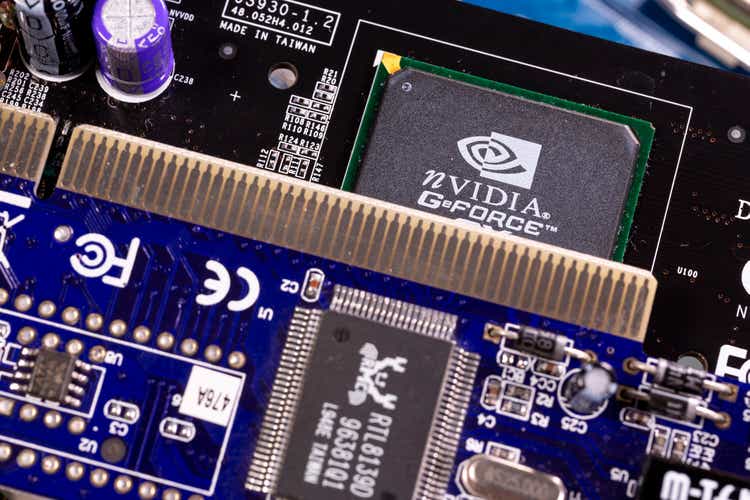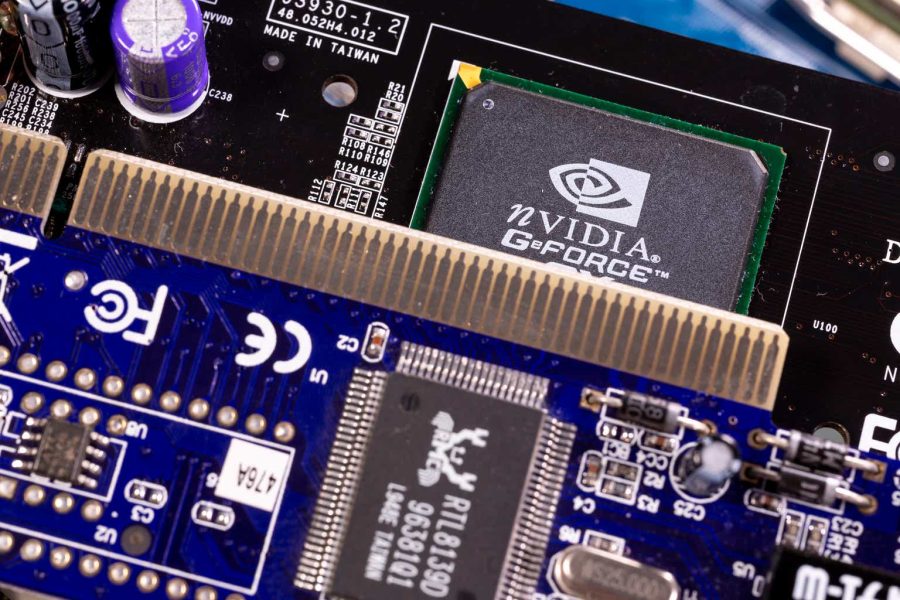Summary:
- Nvidia is expected to report strong earnings with tripled data center revenue and a 16.7% increase in gaming segment revenue.
- The Fed is reportedly looking to reduce the capital requirement increase for the biggest banks.
- UBS recommends investing in companies along the AI value chain, including semiconductors, internet, and data centers, as global AI revenue is projected to exceed $400 billion in the next three years.
Cylonphoto
Analysts generally expect another boost in guidance from Nvidia. (0:17) Big win for banks in capital requirement plans? (3:57) UBS picks its favorite AI stocks. (5:59)
Wall Street will hear for the biggest stock in the market currently when Nvidia (NASDAQ:NVDA) reports earnings on Wednesday.
The chip giant is expected to report revenue of $24.6 billion and EPS of $5.53 for the quarter. Data center revenue is forecast to have more than tripled from a year ago to $20.97 billion, while gaming segment revenue is seen rising 16.7% to $2.61 billion. Nvidia is seen reporting an adjusted gross margin rate of 77%, adjusted operating income of $16.3 billion, and free cash flow of $11.78 billion.
Investors will be looking past the quarterly numbers when determining if Nvidia deserves its $2.3 trillion AI-boosted premium valuation. Analysts largely anticipate that Nvidia will raise the bar with guidance.
Jefferies said even a beat-and-raise quarter from Nvidia could take a backseat to the cadence on the ramp of the Grace Blackwell exascale computer.
“We believe the ramp of the GB200 NVL products is a large driver for the story as NVDA will once again extend their control to a greater portion of the AI system design.”
Seeking Alpha Analyst Mott Capital Management says “the market is pricing a post-earnings move of about 8.5% following Nvidia’s results. Based on market expectations, this could mean the shares trade as high as $1,025 or as low as $865.”
They add that the options skew is leaning to the bullish side of outlook and if “results are better than expected and the stock can get over that $950 resistance level, it would have room to run to the next major level of options resistance at $1,000. However, a failure to get above $950 would lead to the stock decline and potentially finding the first support level at $900 and $850 after that.”
Among other notable earnings this week
Palo Alto Networks (PANW), Li Auto (LI) and Zoom Video (ZM) report on Monday.
Tuesday brings Lowe’s (LOW), Autozone (AZO), Toll Brothers (TOL), XPeng (XPEV) and Macy’s (M).
Along with Nvdia on Wednesday there are results from TJX (TJX), Analog Devices (ADI), Target (TGT), Snowflake (SNOW), Petco Health and Wellness (WOOF) and e.l.f. Beauty (ELF).
Intuit (INTU), Medtronic (MDT), Toronto-Dominion Bank (TD), Ralph Lauren (RL), and Workday (WDAY) weigh in on Thursday.
Booz Allen Hamilton (BAH) and Buckle (BKE) report on Friday.
For those looking to hone their investing skills before Q2 earnings season rolls around, Seeking Alpha is holding its first Investing Summit on June 18 in New York.
It’s a full-day conference where you can learn how to navigate volatility from top executives at Amazon Web Services, Invesco, Schwab, Cantor Fitzgerald and many more. Seeking Alpha’s most sought-after Investing Group leaders and analysts can help you with big investment and trading decisions. And you’ll get a host of opportunities to talk to like-minded investors.
The conference is open to Seeking Alpha subscribers only. You can register at Seeking Alpha Investing Summit – and listeners can enter the code PODCAST at checkout for a 30% discount on your pass.
On the economic front, the minutes of the latest FOMC meeting are due to be out Wednesday afternoon.
Across the Atlantic, European Central Bank President Christine Lagarde and Bank of England Governor Andrew Bailey are also scheduled for key talks.
Durable goods orders for April hit Friday. Economists expect a 0.8% decline on the month, with a 0.2% rise excluding transportation.
Ed Yardeni of Yardeni Research notes that spending “on consumer durable goods, especially housing-related ones, has been flat since early 2021, when single-family new and existing housing fell into a rolling recession as mortgage rates soared. Motor vehicle sales have also been flat over the past two years, though at a solid pace of around (a seasonally adjust annual rate of) 15.5 million units.”
In the news this weekend, three regulatory agencies could significantly reduce a planned increase in capital requirements for the largest banks, which would be a big win for the banking lobby. That’s according to The Wall Street Journal.
JPMorgan Chase (JPM) CEO Jamie Dimon and other CEOs at big banks played hardball and now the Fed, along with the FDIC and the Comptroller of the Currency, could reduce the plan for a 20% mandated increase by about half. The banks argued that such an increase would cut into profits and curb lending, the Journal said.
Dimon told other CEOs to go around the main architect of the plan, Fed Vice Chairman for Banking Supervision Michael Barr, and speak to other officials, including Fed Chairman Jerome Powell.
And days after two top safety execs announced their departure from OpenAI, company CEO Sam Altman and President Greg Brockman tweeted to ease concerns.
On May 14, co-founder and Chief Scientist Ilya Sutskever said he was resigning from the company. Sutskever was a board member who voted to oust Altman from the company back in November 2023.
Later that day, Jan Leike, co-head of OpenAI’s superalignment unit and a colleague of Sutskever, also said he was leaving. Leike said, “I have been disagreeing with OpenAI leadership about the company’s core priorities for quite some time, until we finally reached a breaking point.”
He said that safety culture and processes were not given the priority that was needed, especially regarding artificial general intelligence, a type of AI that can potentially exceed human capabilities across a wide variety of tasks.
Altman and Brockman said: “There’s no proven playbook for how to navigate the path to AGI. We think that empirical understanding can help inform the way forward. We believe both in delivering on the tremendous upside and working to mitigate the serious risks; we take our role here very seriously and carefully weigh feedback on our actions.”
For income investors, Johnson & Johnson (JNJ) will go ex-dividend on Monday with a payout date for June 4. Equinix (EQIX) goes ex-dividend on Tuesday, while Pitney Bowes (PBI) goes ex-dividend on Wednesday. Yum! Brands (YUM) goes ex-dividend on Friday.
And in the Wall Street Research Corner, UBS released a list of stocks it says are set to benefit from the artificial intelligence boom, with global AI revenue on course to top $400B in the next three years.
The brokerage recommended investors get exposure to companies along the AI value chain, including semiconductors, internet, and data centers. UBS forecast global tech AI revenue to hit $420B in 2027, a fifteen-fold increase from $28B in 2022.
It also projected infrastructure spending, driven by GPU cloud and other emerging trends, to reach $195B in 2027 from $25.8B in 2022.
Apart from obvious names like Microsoft (MSFT), Meta (META) and Nvidia (NVDA), UBS highlighted Constellation Energy (CEG), Digital Realty (DLR), Vistra (VST) and Johnson Controls (JCI).

